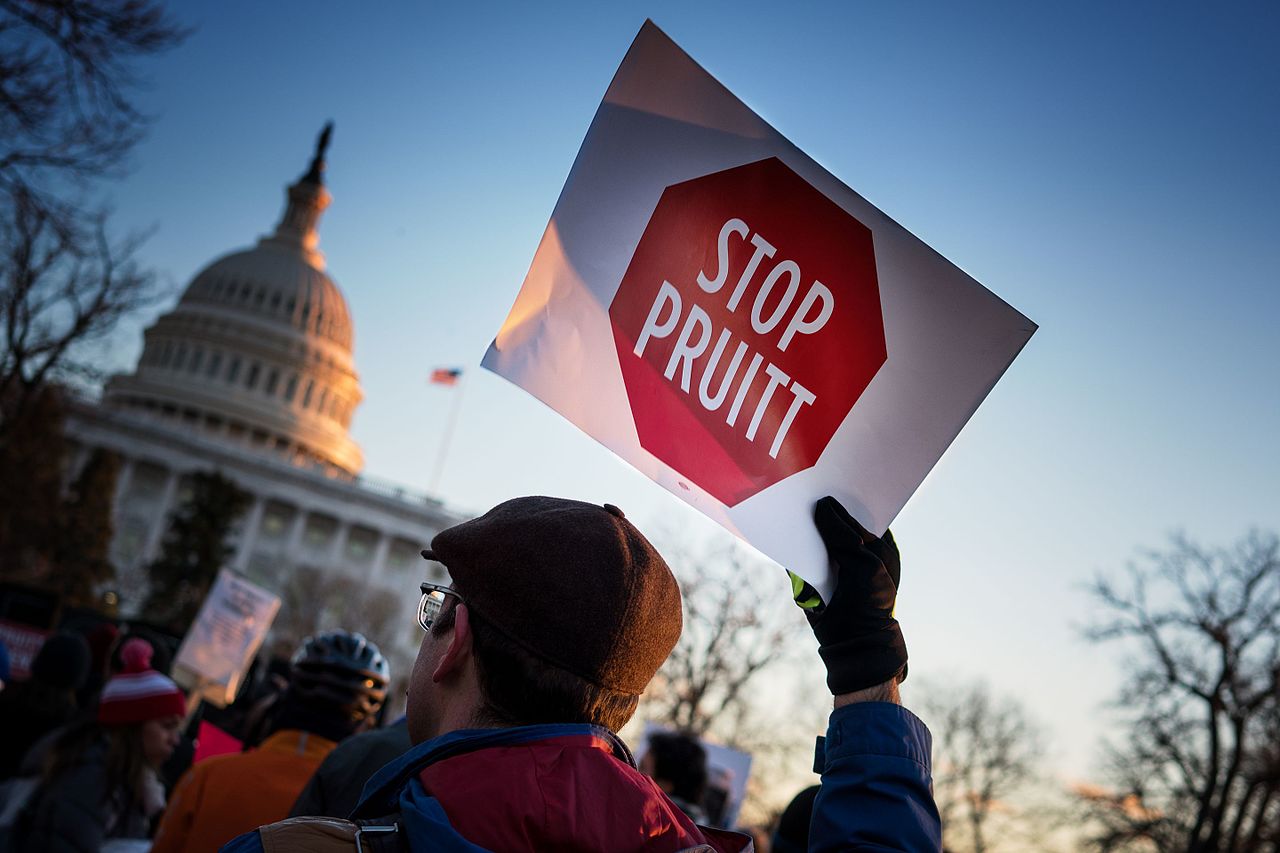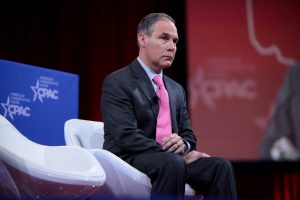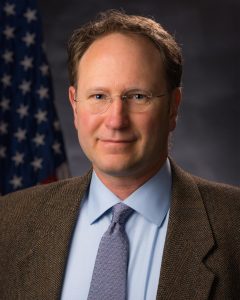
Every decision made “under Pruitt’s tainted leadership must be revisited.”

Scott Pruitt speaking at the 2015 Conservative Political Action Conference (CPAC), Photo by Gage Skidmore via flickr.com cc 2.0
Embattled U.S. EPA Administrator Scott Pruitt resigned last week after months of allegations and investigations into his ethical behavior while he ran the agency.
In his resignation letter to President Trump he did not mention the ethics investigations but cited “unrelenting attacks” on him as the reason for his departure.
In accepting his resignation, President Trump praised Pruitt for having done an “outstanding job” but did not mention Pruitt’s ethical problems in his statement posted on Twitter.
Trump named current Deputy Administrator Andrew Wheeler to replace Pruitt on an acting basis.
Swift reaction
Reaction to Pruitt’s departure was swift.
Former Clinton EPA Administrator Carol Browner in a statement said “ Pruitt’s removal is just the first step in restoring a strong EPA that gets back to its mission to protect public health and our environment.”

Carol Browner, Former Clinton EPA Administrator , Photo by obamawhitehouse.archives.gov via wikimedia
She said every decision made “under Pruitt’s tainted leadership must be revisited.” Browner is now Board Chair of the League of Conservation Voters.
Among those decisions could be Pruitt’s roll back of President Obama’s Waters of the United States rule, also known as the Clean Water Rule. It particularly angered farmers who saw it as federal regulatory overreach of private land.
“This rule was never really about clean water. It was a federal land grab designed to put a straightjacket on farming and private businesses across this nation,” American Farm Bureau president Zippy Duvall said in a June 2017 press release.
Duvall said Pruitt recognized the rule as an “illegal and dangerous mistake that needs to be corrected.”
On Pruitt’s resignation, Farm Bureau spokesperson Will Rodger told Great Lakes Now that “we are following the situation closely” and he defended the rule calling it “unlawful” and said that’s why it’s tied up in courts.
“We are confident Acting Administrator Wheeler will continue the good work the agency has been doing on the Waters of the United States rule and will rework it to comply with U.S. law,” Rodger said.
“Philosophy problem”
Cameron Davis told Great Lakes Now that because Pruitt was allowed to resign instead of being fired “tells us that the Administration doesn’t have a people problem, it has a philosophy problem.”
Davis said going forward he doesn’t see a “direct assault” on Great Lakes programs but expects the threat will come “indirectly by slow-walking the agency’s mission, straining the US-Canada relationship, and trying to push more burden to tribes, states and municipalities.”

Cameron Davis, Former Senior Advisor to the U.S. EPA Administrator, Photo by epa.gov
Davis oversaw Great Lakes restoration programs in the Obama administration and is now a candidate in the Fall elections for commissioner of Chicago’s Metropolitan Water Reclamation District.
In Chicago, Josh Mogerman recited a long list of Pruitt actions that hurt the environment including “suffocating the essential brain power of the professionals” in the Great Lakes region EPA office.
Mogerman is the National Media Director for the Natural Resources Defense Council.
He said “Pruitt’s behavior has been impossible to ignore and the public is watching the agency like never before and they don’t like what they see.”
Hasty legal work
Prior to leading the EPA, Pruitt was Oklahoma’s Attorney General and he sued the EPA 14 times, mostly related to President Obama’s rules meant to protect air and water.
But Nick Schroeck says “in his haste to attack anything associated with the Obama Administration, Pruitt and his team were not always as careful as they could have been.”

Nick Schroeck, Director of the Transnational Environmental Law Clinic, Photo by Great Lakes Now
Schroeck expects “that courts will likely remand or overturn some of their hasty and knee-jerk actions.”
But he points out a serious negative outcome of Pruitt’s tenure for people living near industrial facilities in Detroit, Chicago, and elsewhere.
“Pruitt’s EPA weakened air toxic prevention rules. By stalling the Clean Power Plan, Pruitt slowed down the eventual retirement of old, dirty coal plants, meaning that people will be exposed to more pollution over time than they would have been,” Schroeck said.
Schroeck is a law professor who will begin directing Clinical Programs at University of Detroit Mercy School of Law in mid-July.
“Great consternation in Canada”
Canadian environmental and social justice advocate Maude Barlow is an interested observer of Great Lakes and U.S. environmental policy.
Barlow told Great Lakes Now that “the tragedy about Scott Pruitt’s resignation is that it is linked to his scandals and not to his intention to undermine everything the EPA was created to do, including enforcing the historic Clean Air and Clean Water Acts.”

Maude Barlow speaking at
Peoples Social Forum 2014, Photo by Ben Powless via flickr.com cc 2.0
She said that Pruitt’s policies have “caused great consternation in Canada, where the Trudeau government has promised to increase protections on our side of the lakes.” She fears his successor will continue the assault on the EPA but in a “quieter and less public way.”
Barlow is the Honorary Chairperson of the Council of Canadians and is a frequent advocate in Michigan for water as a human right.
Darren Nichols at the Great Lakes Commission did not comment on Pruitt’s departure.
Nichols emphasized to Great Lakes Now that the EPA “is a key partner in efforts to restore the Great Lakes” and said the commission “looks forward to working closely with acting administrator Wheeler and our colleagues at EPA Region 5 during the transition.”
Nichols said he “welcomed an opportunity to brief the new administrator on the vital importance of investing in collaborative governance across the Great Lakes and St. Lawrence basin – to protect the lakes and secure America’s economic future.”
Nichols is the commission’s Executive Director who recently joined the organization.
It’s expected that Wheeler, a former coal industry lobbyist, will continue to push President Trump’s agenda which has included attempts to eliminate all funding for Great Lakes restoration programs.
A permanent replacement for Pruitt requires senate confirmation.
Featured Image, Stop Pruitt, Rally To Oppose EPA Nominee Scott Pruitt, Photo by Lorie Shaull via wikimedia cc 2.0




